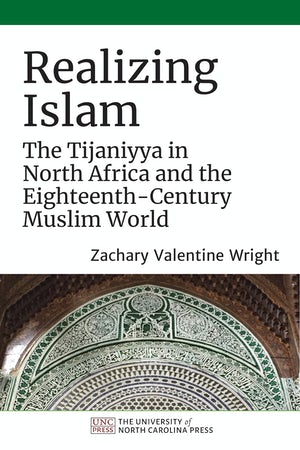A new book by Zachary Wright explores eighteenth-century Islamic scholarship in North Africa, with particular focus on the founding of Africa’s largest Sufi order, the Tijaniyya.
Realizing Islam: The Tijaniyya in North Africa and the Eighteenth-Century Muslim World argues that Muslim scholars from India to West Africa shared in intellectual debates and exchanges, collectively motivated by the desire to verify the foundations of law, theology, and mysticism. But local contexts dictated that Islamic revivalist thinkers went about this project of verification in divergent ways.
Wright, a scholar of Islam in Africa, has written and taught extensively on the history of Muslim societies in the African continent, Islamic intellectual history and learning practices in West and North Africa, and Islamic renewal in the Middle East and North African region from the 18th century.
His latest book takes his research further, he said, by drawing connections between “Muslim communities in the Arab world and those in sub-Saharan Africa,” an observation that he claims, refutes the notion that the Sahara desert was a barrier rendering sub-Saharan Africa intellectually peripheral to the rest of the Muslim world. The book also provides an analysis of the Sufi thought within the Tijaniyya, tracing its origins and development throughout the late 18th century and analyzing scholarly work and ideas that emerged as the order spread in Africa and around the world.
“My book delves into the intellectual history of Islam in Africa and suggests that the reception of the Tijaniyya in sub-Saharan Africa can be explained by the fact that black African Muslim scholars prefigured most of the key ideas associated with the doctrine of “Muhammadan Sufism” (tariqa Muhamadiyya) so central to the revivalism of Shaykh Ahmad al-Tijani,” Wright said.
Realizing Islam: The Tijaniyya in North Africa and the Eighteenth-Century Muslim World is being published by the University of North Carolina Press. An early review by Publisher’s Weekly said that it was a “…thorough work [that] shines light on a little-known example of the diversity, vitality, and worldwide scope of Islamic knowledge and Muslim communities.”
Earlier this year, Wright presented his research at the “Program of African Studies, Institute for the Study of Islamic Thought in Africa” on the Northwestern home campus. He gave a lecture on “Intellectual Networks and Islamic Realization in 18th Century North Africa,” and shared insights in Islamic intellectual history and Islam in Africa. He has also presented research related to this book at the Harvard Divinity School, Georgetown University’s Center for Muslim-Christian understanding, NYU-Abu Dhabi’s Arab Crossroads program, and HBKU’s College of Islamic Studies.
Wright is an associate professor in residence at NU-Q, with joint appointments in history and religious studies. He earned his Ph.D. from Northwestern University, with a dissertation focusing on the history of Islamic knowledge transmission in West Africa. Wright’s work has focused primarily on Islamic learning and Sufism in West Africa. His other book publications include Jihad of the Pen: the Sufi Literature in West Africa (AUC Press), and Living Knowledge in West African Islam (Brill).

